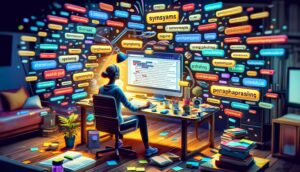AI writing tools are super useful, but do you know how to not get caught with ChatGPT? Feeling nervous about getting caught using ChatGPT?
That’s totally normal.
With AI tech getting better every day, especially after ChatGPT hit the scene, it’s no wonder we’re all a bit jumpy.

Try these new AI-powered tools:
- 5 Best AI Detectors To Unmask AI-Written Content With Accuracy
- 5 Best AI Writers To Boost Your Productivity And Content Quality.
- This "Secret AI Writer" Can Bypass AI Detection Like A Pro.
We’ve got a no-sweat guide packed with clever tricks to use this awesome tool without anyone being the wiser.
Article At-A-Glance
- Get the scoop on using ChatGPT smartly and safely, keeping the risk of getting caught super low.
- Navigating ChatGPT means knowing the risks – like data leaks, biased content, or misuse.
- Avoid ChatGPT troubles by using the latest GPT-4 model, dodging detection, and sticking to trustworthy info.
- ChatGPT is a big deal in AI, with loads of perks but some downsides too. Finding the right balance between using it wisely and ethical concerns is key.
Table Of Contents
Getting The Hang Of ChatGPT And Its Risks
ChatGPT’s a nifty AI tool for making content but comes with some risks. Misusing it could get you in hot water for plagiarism.
Knowing these risks helps you use it the right way.
ChatGPT’s a game-changer in AI, whipped up by OpenAI. This AI chatbot can have written chats with users, remembering past talks for better, more relevant answers.
This tech opens doors for easy communication and cool dialogue systems, but using it wrong can cause ethical headaches.
Some schools even blocked ChatGPT, worried about cheating and messing with academic honesty.
How To Not Get Caught With ChatGPT
To dodge the ChatGPT cheating trap, you gotta use the GPT-4 model, stay off detection radars, and always go for legit sources.
Be on time with your work and give credit where it’s due. And always remember, playing fair in school is super important.
Keep reading to learn how to not get caught with ChatGPT.
Go For GPT-4 Model
I count on GPT-4 Model to avoid ChatGPT cheating issues. This top-notch AI tool, the next step after GPT-3, puts advanced tech in my hands and keeps me honest.
Just to be clear, I’m not using it for shady stuff. I focus on the good parts, like making content or helping with research.
Using it ethically helps me tackle tough writing tasks while keeping AI use fair and facing AI ethical challenges.
Staying Out Of Detection’s Way
Putting some effort into learning how to dodge detection can really pay off. Lots of schools use fancy software to spot ChatGPT cheating.
But, if you know what these systems are sniffing out, you can stay a step ahead. Like, the GPT-4 Model makes stuff that sounds more human, so it’s less likely to set off alarm bells.
But, if you know what these systems are sniffing out, you can stay a step ahead. Like, the GPT-4 Model makes stuff that sounds more human, so it’s less likely to set off alarm bells.
Remember though, the main thing is to avoid cheating in any form. It’s not just wrong, but you could face serious trouble if you’re caught.
Using ChatGPT the right way gives you a leg up, without playing dirty.
Pick The Right Sources
Choosing solid info from sources you can trust is key to not getting nabbed using ChatGPT to cheat.
These legit sources have facts that can really beef up your work and make it tough for anyone to think AI’s involved.
Think about adding well-known references and data that’s been checked out. It’s not just about staying clear of cheating claims, but also making your work look legit.
Using top-notch info shows you’ve really dug into your research, instead of just leaning on ChatGPT. That’s playing it smart!
Give Credit Where It’s Due
Making sure to cite any sources you use with ChatGPT is super important. Here’s why: not giving credit is like taking someone else’s hard work and calling it your own.
Mixing your work with well-cited sources shows your assignment’s legit. It lets folks know you’ve done your homework and checked your facts.
This practice isn’t just about playing by the rules; it’s also about respecting the fair use of info and avoiding any hints of plagiarism when you’re using tools like ChatGPT.
Keep It Honest
Staying honest in your schoolwork means keeping away from plagiarism and trickery, especially with tools like ChatGPT. It’s about more than just not using AI for cheating; it’s making sure to credit any sources you use.
ChatGPT’s caught some flak from teachers who worry it’s making cheating easier.
So, as a user, be careful and aim for original work over easy shortcuts.
It’s not just about your grades; being honest is key for your future career, too!
So be careful with using fancy AI to help with your schoolwork or making stuff.
In the world of AI, ChatGPT is a bit of a double-edged sword. It’s super useful for teachers and profs who’ve brought it into their classrooms.
That’s your cue to know how to not get caught with ChatGPT. Keeping your ChatGPT-made content under wraps is key.
Also, customer service bosses are finding AI like ChatGPT super helpful. But with these perks, there are real risks. Bad guys could use it to scoop up info or pull off scams—real concerns in our digital world where data’s like gold and security risks are everywhere.
And don’t forget, AI tech is like the Wild West, law-wise. They’re racing to catch up with all these new tech leaps.
So while we’re digging the benefits of AI stuff like ChatGPT, we gotta keep an eye on the ethical side of things.
Spotting ChatGPT In Action
Your work might get a manual check, and tools like Turnitin and AI plagiarism detectors can spot signs of ChatGPT.
Manual Checks
When I’m checking papers by hand, I look closely for hints of ChatGPT use.
Everyone’s got their own writing style, so if there’s a weird shift in how it sounds, that could mean AI’s been involved.
Everyone’s got their own writing style, so if there’s a weird shift in how it sounds, that could mean AI’s been involved.
It’s not just about the writing itself; knowing students’ usual work helps spot those AI bits.
So don’t think you can slip past good old human checking!
Online Detectors
Online tools are our main line of defense against AI-written stuff like ChatGPT. They use fancy algorithms to check how assignments are written, quick to point out any AI use.
They’re not perfect, though—they might flag stuff that’s totally fine.
OpenAI’s stepped up, making a tool to find ChatGPT work, so there’s less chance of getting it wrong.
Even with all this tech, remember that cheating with these tools doesn’t match up to real learning.
AI Plagiarism Tools
AI plagiarism detectors are all the rage. I gave them a whirl and they’re pretty sharp at finding stuff copied from ChatGPT, but it’s not a cakewalk.
These tools look for things like matching styles or patterns to find AI-written text, even when it looks original at first glance. They’re getting better at catching sneaky academic shortcuts.
OpenAI’s even made a new tool to spot when students use ChatGPT for cheating, putting a unique “watermark” on its outputs!
But there’s still a big question mark on whether everyday tools like Turnitin can catch content made by ChatGPT.
Dodging Trouble with ChatGPT: A Student’s Guide
Even with all the tech smarts from companies like OpenAI, there’s still a big question: Can everyday tools like Turnitin catch stuff written by ChatGPT?
The Fallout of Being Busted with ChatGPT
Getting caught cheating with ChatGPT? That can land you in some serious school trouble. Schools are really cracking down to make sure everyone’s on a level playing field and sticking to the rules.
If they catch you, you could be looking at flunking, a mark on your record, getting suspended, or even kicked out.
And it’s not just about grades. Losing trust from your teachers and classmates can stick around way longer than any punishment.
With tech moving so fast, it’s super important to keep up, but you gotta play it straight and follow the ethical playbook.
Legal Tightropes
Using ChatGPT can be like walking a legal tightrope. It’s easy to accidentally step into copyright trouble by making stuff that’s too similar to other sources.
Then there’s the whole data privacy thing. These AI tools use a ton of info, both public and private, to come up with answers.
Lawyers using ChatGPT might run into their own sticky situations, like accidentally sharing stuff they shouldn’t.
Lawyers using ChatGPT might run into their own sticky situations, like accidentally sharing stuff they shouldn’t.
Companies can even ban ChatGPT at work if they’re worried about it messing up or creating biased content.
All this means there’s a bunch of legal stuff to think about when you’re using AI writers like ChatGPT.
Work Implications
If you’re caught using ChatGPT on the job, it could really throw a wrench in your career. Say you’re up for a promotion and then they find out about your ChatGPT use.
Suddenly, all your hard work is under a microscope. It’s not just about losing trust; you could even get fired if it goes against your job’s rules.
Employers are super focused on keeping data safe and private, and they don’t want employees using iffy AI tools.
Even if it doesn’t get you in trouble right away, it could mess up your chances for good references or future jobs, putting a big dent in your career path.
Staying Sneaky With ChatGPT
If you want to use ChatGPT without getting caught, try out smarter AI writers that sound more natural. Think about using different AI tools for more kinds of content.
But remember, knowing the risks is key to using it right and staying out of trouble.
Smarter AI Writing
Using smart AI writers wisely can really make a difference in school. Tools like the newer ChatGPT models are made to crank out top-notch work without setting off plagiarism alarms.
They’re not just brainy; they’re set up for tricky language stuff that older models couldn’t handle. But remember, it’s all about keeping it honest and not using these tools to cheat on your schoolwork.
As long as you’re keeping things above board, these AI helpers can be a huge help in your school journey.
Looking Beyond ChatGPT
Checking out other AI options is a smart move. Take Bard, for example. It’s a cool alternative to ChatGPT. It’s got the smarts for creating text just like ChatGPT, but it’s got a bonus feature—it works offline.
So if staying clear of online risks is on your mind, or if you just want a plan B, Bard might just be what you’re looking for!
Eyeing The Risks
I’m always on my toes about the risks that come with ChatGPT. Data breaches are at the top of my worry list. The thought of private info getting into the wrong hands is always lurking in the back of my mind.
Then there’s the worry about AI churning out stuff that’s biased or just plain wrong, not to mention the chance of folks using it for shady stuff like scooping up info or making fake text.
Then there’s the worry about AI churning out stuff that’s biased or just plain wrong, not to mention the chance of folks using it for shady stuff like scooping up info or making fake text.
Getting the hang of these risks just drives home how important it is to be careful when you’re diving into AI.
Using ChatGPT Wisely
ChatGPT can be super helpful, but it’s key to remember how important being honest and upright is, whether you’re in school or at work.
Put these strategies to work when you’re using ChatGPT to make sure you’re staying on the right side of the line.
Meet our resident tech wizard, Steve the AI Guy. Now, before you get any wild ideas, let’s clear up one thing – he’s 100% human! I mean, he’s got the work history to prove it. He spent a decade diving into the deep end of the tech industry doing business intelligence work, splashing around with two of the world’s largest business consulting companies, Deloitte and Ernst & Young. Learn More










